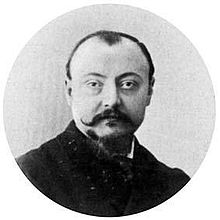
Gustav Geley (13 April 1868 – 15 July 1924) was a French physician, psychical researcher and director of the Institute Metapsychique International from 1919 to 1924. [1]

Gustav Geley (13 April 1868 – 15 July 1924) was a French physician, psychical researcher and director of the Institute Metapsychique International from 1919 to 1924. [1]
Geley was born in 1868 at Montceau-les-Mines, France. He studied medicine in Annecy. In 1919, he gave up his practice as a physician and become the director of the Institut Mètapsychique International. [1] He was a spiritist and a believer in reincarnation. [2]
In the early 20th century Joaquin María Argamasilla known as the "Spaniard with X-ray Eyes" claimed to be able to read handwriting or numbers on dice through closed metal boxes. Argamasilla managed to fool Geley and Charles Richet into believing he had genuine psychic powers. [3] In 1924 he was exposed by Harry Houdini as a fraud. Argamasilla peeked through his simple blindfold and lifted up the edge of the box so he could look inside it without others noticing. [4]
Geley investigated the physical mediumship of Eva Carrière and Franek Kluski, [1] and endorsed the abilities of Carrière. [5] It was reported in the Encyclopedia of Occultism and Parapsychology that Geley's "belief system seems to have made him a target for tricks by the mediums he studied and, in the end, capable of suppressing negative evidence." [2]
In 1954, the SPR member Rudolf Lambert published a report revealing details about a case of fraud that was covered up by many early members of the Institute Metapsychique International (IMI). [6] Lambert who had studied Geley's files on Eva Carrière discovered photographs depicting fraudulent ectoplasm taken by her companion Juliette Bisson. [6] Various "materializations" were artificially attached to Eva's hair by wires. The discovery was never published by Geley. Eugene Osty (the director of the institute) and members Jean Meyer, Albert von Schrenck-Notzing and Charles Richet all knew about the fraudulent photographs but were firm believers in mediumship phenomena so demanded the scandal be kept secret. [6]
According to James Randi, Geley had a "very strong need for belief in the hereafter", as evidenced by Geley's statement, "Robbed of its illusions, individual existence seems a real misfortune if it endures only from birth to death. [5] Geley's book Unconscious to the Conscious has been described as "almost a bible of reincarnationism." [7]
Geley died in an airplane accident on 15 July 1924. He was 56. [1]

Charles Robert Richet was a French physiologist at the Collège de France and immunology pioneer. In 1913, he won the Nobel Prize in Physiology or Medicine "in recognition of his work on anaphylaxis". Richet devoted many years to the study of paranormal and spiritualist phenomena, coining the term "ectoplasm". He believed in the inferiority of black people, was a proponent of eugenics, and presided over the French Eugenics Society towards the end of his life. The Richet line of professorships of medical science continued through his son Charles and his grandson Gabriel. Gabriel Richet was also one of the pioneers of European nephrology.

In spiritualism, paranormal literature and some religions, materialization is the creation or appearance of matter from unknown sources. The existence of materialization has not been confirmed by laboratory experiments. Numerous cases of fraudulent materialization demonstrations by mediums have been exposed.

Mediumship is the practice of purportedly mediating communication between familiar spirits or spirits of the dead and living human beings. Practitioners are known as "mediums" or "spirit mediums". There are different types of mediumship or spirit channelling, including séance tables, trance, and ouija.

Eusapia Palladino was an Italian Spiritualist physical medium. She claimed extraordinary powers such as the ability to levitate tables, communicate with the dead through her spirit guide John King, and to produce other supernatural phenomena.

Dermo-optical perception is a term that is used in parapsychological literature to denote the alleged capability to perceive colors, differences in brightness, and/or formed images through the skin, especially upon touching with the fingertips.
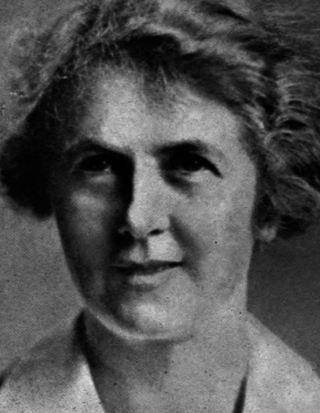
Mina "Margery" Crandon was a psychical medium who claimed that she channeled her dead brother, Walter Stinson. Investigators who studied Crandon concluded that she had no such paranormal ability, and others detected her in outright deception. She became known as her alleged paranormal skills were touted by Sherlock Holmes author Sir Arthur Conan Doyle and were disproved by magician Harry Houdini. Crandon was investigated by members of the American Society for Psychical Research and employees of the Scientific American.

Ectoplasm is a term used in spiritualism to denote a substance or spiritual energy "exteriorized" by physical mediums. It was coined in 1894 by psychical researcher Charles Richet. Although the term is widespread in popular culture, there is no scientific evidence that ectoplasm exists and many purported examples were exposed as hoaxes fashioned from cheesecloth, gauze or other natural substances.
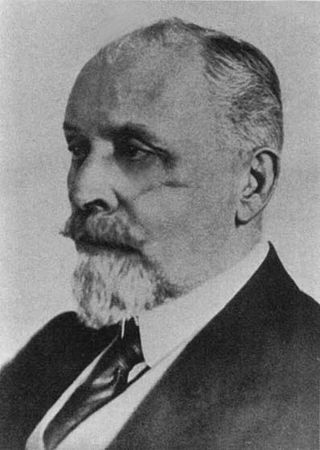
Albert Freiherr von Schrenck-Notzing was a German physician, psychiatrist and notable psychical researcher, who devoted his time to the study of paranormal events connected with mediumship, hypnotism and telepathy. He investigated Spiritualist mediums such as Willi Schneider, Rudi Schneider, and Valentine Dencausse. He is credited as the first forensic psychologist by Guinness World Records.

Rudi Schneider, son of Josef Schneider and brother of Willi Schneider, was an Austrian Spiritualist and physical medium. His career was covered extensively by the Journal of the American Society for Psychical Research, and he took part in a number of notable experiments conducted by paranormal researchers/debunkers, including Harry Price, Albert von Schrenck-Notzing and Eric Dingwall. Some of these researchers declared him to be a fraud while others were unable to find evidence of trickery.
The American Society for Psychical Research (ASPR) is the oldest psychical research organization in the United States dedicated to parapsychology. It maintains offices and a library, in New York City, which are open to both members and the general public. The society has an open membership, anyone with an interest in psychical research is invited to join. It maintains a website; and publishes the quarterly Journal of the American Society for Psychical Research.

Eva Carrière, also known as Eva C, was a fraudulent materialization medium in the early 20th century known for making fake ectoplasm from chewed paper and cut-out faces from magazines and newspapers.

Franek Kluski, real name Teofil Modrzejewski (1873-1943), was a Polish physical medium criticized by trained magicians and skeptics as a fraud. Kluski was best known for his séances in which alleged "spirit" molds of hands materialized. It was later demonstrated by Massimo Polidoro and chemist Luigi Garlaschelli that these molds could have easily been made by fraudulent methods.

Walter Franklin Prince was an American parapsychologist and founder of the Boston Society for Psychical Research in Boston.

Joseph Francis Rinn (1868–1952) was an American magician and skeptic of paranormal phenomena.
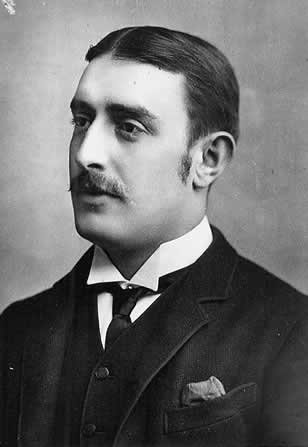
William Eglinton (1857–1933), also known as William Eglington was a British spiritualist medium who was exposed as a fraud.
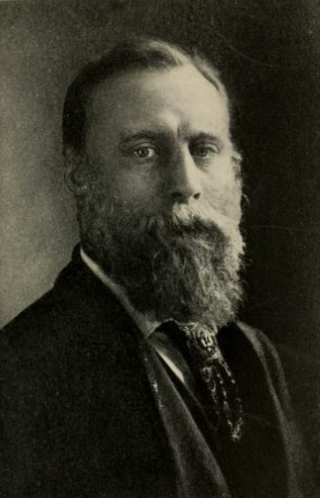
Richard Hodgson was an Australian-born psychical researcher who investigated spiritualist mediums such as Eusapia Palladino and Leonora Piper. During his later life, Hodgson became a spiritualist medium himself and believed to be in communication with spirits.
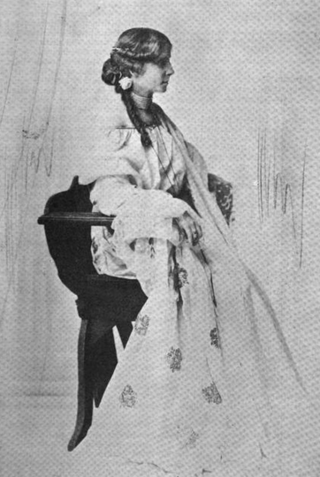
Anna Eva Fay Pingree was a famous medium and stage mentalist of the twentieth century.
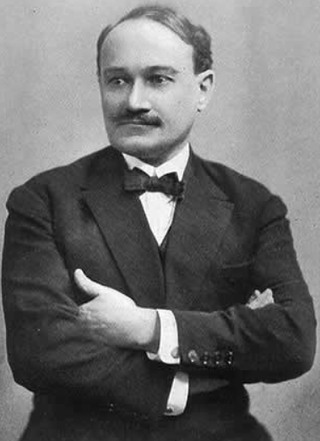
Eugène Osty was a French physician and psychical researcher.
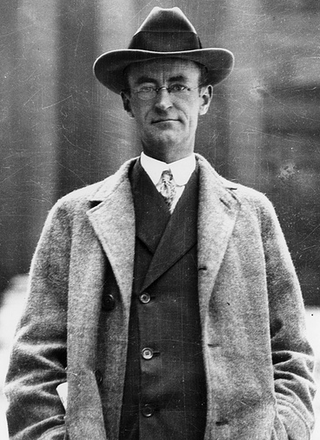
James Malcolm Bird was an American mathematician and parapsychologist.

Joaquín María Argamasilla de la Cerda y Elío was a Spanish noble who was the 11th Marquess de Santacara, but he is better known for claiming in the early 1920s a supposed ability to see through opaque objects. Argamasilla convinced important people of the era such as Gustav Geley and Charles Richet of his powers, but he was exposed by Harry Houdini as a fraud in 1924.